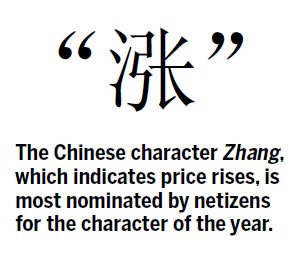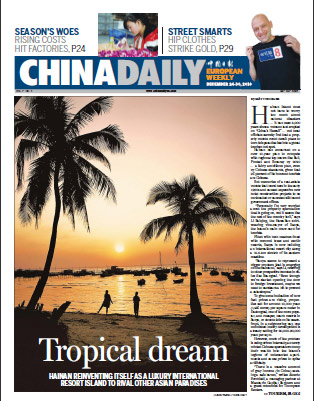Inflation hits 2010 character poll voting
Updated: 2010-11-17 07:15
By Cheng Yingqi (China Daily)
Nominations reflect changes in everyday life
BEIJING - Chinese netizens have conducted heated online discussions to choose the character of the year, with (zhang), indicating price rises, the most popular so far.

Tianya.cn, a popular online forum in China, opened a platform for Internet users to nominate the "Character of the Year 2010" on Nov 2. The nomination had attracted more than 100,000 clicks and 4,000 replies by 4:30 pm on Tuesday. And zhang attracted more than 80,000 clicks.
Summarizing the major events of a year with a character first became popular in Japan in the mid-1990s. Some Chinese media introduced this practice in 2006.
"Prices for everything are rising so much that I am panicking," said a netizen named qqq915 on Nov 3, while giving his reasons for supporting zhang as the character of 2010.
Since the beginning of 2010, the price of sugar has increased 100 percent and the price of garlic ten-fold in some regions of China. Hot pepper rose from 4 yuan ($0.60) a kilogram to 40 yuan in May in Beijing, and the price of potatoes surged 84.8 percent from January to June.
Prices of pork, eggs, ginger, silk, mung beans, cotton, soybeans, bean oil and even apples have also jumped month by month, earlier reports showed.
|
Price rises pressure families BEIJING - About half of Chinese urban families plan to tighten their purse strings next year amid mounting inflation and stagnant incomes, a new survey has found. Their rural counterparts feel more pressure from the current round of price hikes, with about 63 percent of them planning to cut their household consumption, according to the survey conducted by the Horizon Research and Consultancy Group in mid-October. The survey randomly questioned 4,143 residents in seven cities, including Beijing and Shanghai, seven towns and some rural areas in seven provinces such as Zhejiang and Hunan. The consumer price index (CPI) of China, a main gauge of inflation, surged 4.4 percent year-on-year in October to a 25-month high, stoking inflation fears, the National Bureau of Statistics said on Nov 11. The survey suggested the lack of substantial pay rises was one of the major reasons for the planned spending cuts. |
"But intensive financial input is not the only source of inflationary pressure," Ding said. "The home market is also affected by the roaring international market."
The country's consumer price index (CPI), a main gauge of inflation, is likely to increase by 4 percent in 2010 over the previous year, Niu Li, a researcher with the State Information Center, said on Nov 12, Xinhua News Agency reported.
Ding expected this round of inflation to end in the first half of 2011.
"Skyrocketing food prices have forced me to pay 200 yuan more on food every month, so I have to save the money from entertainment and clothes," said Guo Min, a white-collar worker in Beijing.
Besides zhang, characters such as huang (flurried), yuan (resentment), tan (sigh) and chai (demolish) were also popular choices for the character of the year, according to Ying Jianqun, head of the press department of Tianya.cn.
Nominations will close on Dec 20, and three or four of the nominated characters will be listed on the Tianya.cn website for netizens to cast their votes between Dec 24 and Dec 26. The character with the most votes will be named the character of the year.
"This year's nominations reflect changes in people's living conditions," Ying said. "Because of inflation, some feel flurried, some are resentful and some just sigh. Other people are worried that their homes will be demolished."
In 2009, 90 percent of votes went to the character (bei), which means "be said to be".
China Daily
(China Daily 11/17/2010 page4)
Paper's Digest

Jingle bells
The younger generation and every king of retailer are embracing the christmas holiday more than ever before across China.
Chinese shoppers boost luxury market
Growing appetite for foreign firms
Happiness quotient
Specials

If you're happy and you know it
Chinese J.K. Rowling's best-selling children's works are rapidly finding a foreign audience

Clothes maketh this man
English entrepreneur pioneers hip streetwear culture and becomes one of the locals in old Beijing.

Ich bin ein Beijinger
German sinologist's lifelong connection with China is deeply rooted.
